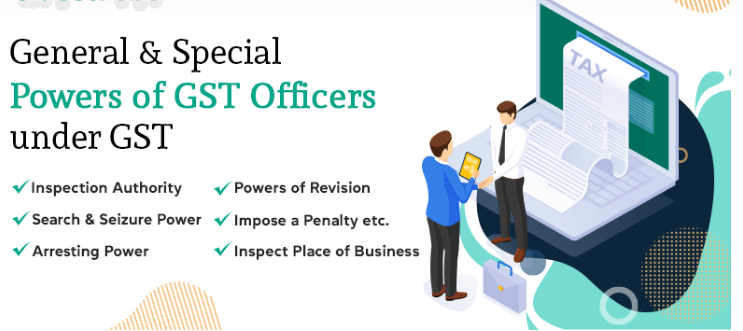Summarized list of Points on GST officers & their powers
Summarized list of 30 points on GST officers & their powers
The following points outline the comprehensive powers and responsibilities of GST officers under the Goods and Services Tax law, ensuring adherence to tax regulations and efficient tax administration.
- Classes of Officers: Various officer ranks like Principal Chief Commissioner, Commissioner, etc., under Goods and Services Tax.
- Appointment of Officers: Central Board of Indirect Taxes and Customs appoints Goods and Services Tax officers, delegating lower ranks as necessary.
- Powers of Officers: Officers act within powers given by the Goods and Services Tax Act and Central Board of Indirect Taxes and Customs’s conditions.
- Delegation of Powers: Commissioners can delegate powers to subordinates under certain conditions.
- Inspection Authority: Joint Commissioners and above can authorize inspections.
- Search and Seizure under GST : Officers may search and seize goods/documents to prevent tax evasion. In GST, search and seizure actions are indeed conducted exclusively by authorized officers who act under the direction and authority granted by the Commissioner of Central or State Tax. key elements of these actions: Authorization Requirement, Reasonable Belief, Scope of Search, Seizure of Evidence, Process Compliance
- Arrest Powers: Officers can arrest suspects of Goods and Services Tax offenses, following due process.
- Summoning Individuals: Officers can summon people for evidence/documents in Goods and Services Tax
- Access to Business Premises: Officers can inspect business premises and records.
- Audit and Verification: Officers can audit to ensure compliance with Goods and Services Tax.
- Demand and Recovery: They can issue tax demands and start recovery actions.
- Penalty Imposition: Officers impose penalties for non-compliance, like late filings.
- Special Audit: Complex cases may lead to audits by appointed accountants.
- Blocking of Input tax credit: Officers can temporarily block Input Tax Credit if misuse is suspected.
- Revisional Powers: Commissioners can review subordinate officers’ decisions.
- Cross-Empowerment: State/UT Goods and Services Tax officers can act as CGST officers in specific cases.
- Prohibition of Parallel Proceedings: No duplicate proceedings under different Goods and Services Tax
- Data Collection: Officers collect necessary data for Goods and Services Tax
- Information Access: Officers access information from other governmental sources.
- Summoning for Evidence: Officers summon individuals to give evidence during inquiries.
- Inspection of Goods in Transit: Officers inspect goods/e-way bills during transit.
- Seizure of Goods: Goods without documents can be seized until compliance.
- Confiscation of Goods: Officers can confiscate goods/conveyances for major violations.
- Provisional Attachment: Property can be attached temporarily to protect revenue.
- Cancellation of Registration: Officers can cancel Goods and Services Tax registration for non-compliance.
- Suspension of GST Registration : Registration may be suspended pending cancellation.
- Assessment of Non-Filers: Officers assess liability for non-filers.
- Best Judgment Assessment under GST : Tax can be assessed based on available info if returns aren’t filed.
- Advance Ruling Authority: Some officers serve on the authority for advance tax rulings.
- Appeal Handling: Officers handle appeals and disputes in the Goods and Services Tax

